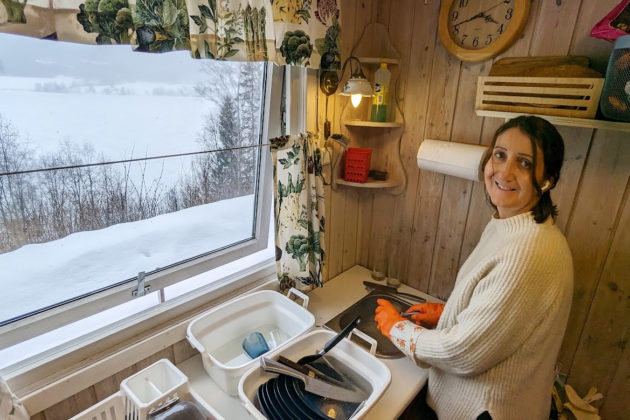Stomach sickness after cabin holiday? You’re not alone

Easter is the peak season for cabin holidays. Nofima scientists have investigated how cabin life affects food safety – and eating habits. About three times more people report an upset stomach during or immediately after visiting a cabin compared to home.
“If you have a cabin where the standard is similar to home, there are no major differences in kitchen habits or the risk of food poisoning. Cabins with a simpler standard, on the other hand, present several challenges. A lack of running water and electricity affects food safety, both because we change our routines and because options for cooling and heating food are limited,” says Valérie Almli, Senior Scientist at Nofima.
She has led the study in which consumers are asked about cabin standards, food and kitchen habits and cases of upset stomach or vomiting.
The cabin standard is important for food safety
Just over half of the respondents have cabins where the standard is similar to home, i.e. high standard. About a third have electricity at the cabin, but no running water, while one in six has a cabin with neither electricity nor running water.
If you spend Easter in a high-standard cabin, there is no greater risk of food poisoning than at home, and the kitchen routines are about the same. At the opposite end are the figures for stays in cabins without neither electricity nor water. There are four times more people who get an upset stomach from staying at such a low-standard cabin than if they are at home or in a cabin of high standard. While the risk is three times higher when the cabin has electricity but no running water.
Lack of running water is the main cause of food poisoning
There are three factors in particular that affect food safety in cabins. These are handwashing and dishwashing hygiene, heat treatment facilities and refrigeration facilities for foods.
“Our study shows that lack of running water is most significant. This is due to several factors: An important reason is person-to-person transmission. Such infection can be transmitted when washing hands in the same water. One in three fills up a basin or sink with water, leaving this water so that more people use the same, perhaps cold, water. There are also quite a few who do not use soap for hand washing at the cabin. The dishwashing routines aren’t always the best either. 30 per cent state that they never change the water during a dishwashing session. In addition, water quality and possible bacteria in drinking water can be important,” says Valérie Almli.
Lack of electricity leads to other routines for heat treatment and cooling, which can also affect food safety. This may, for example, mean that refrigerated goods are stored in a cooler bag where temperature control is poorer or that the grill is more diligent in use.
“Our data show that knowledge doesn’t necessarily help. If you don’t have running water, it doesn’t help much that you’re proficient in microbiology. It goes beyond hygiene when things are cumbersome, and that applies to everyone. At the same time, we see that routines that apply at the cabin are often inherited, and many people follow practices that take hygiene into account without thinking about it,” Valérie Almli points out.
Another clear tendency is that cabin people in cabins without running water use far more paper towels and wipes. Especially for wiping kitchen counters and tables. They are also more diligent users of disposable tableware. They probably do this because it’s easier, but at the same time it can be positive for kitchen hygiene.
More sausages and canned food, less chicken and vegetables
“People eat more hot dogs, canned food and potato chips, and drink more cocoa when they are at the cabin. While they eat less chicken, sushi, smoked salmon, cheeses and vegetables. This is independent of the cabin standard, and is probably due to a combination of convenience and wanting to treat yourself a little extra,” says Valérie Almli.
It is rarer for cabin people in cabins without running water and electricity to eat food after the use by date. This is probably due to the fact that they do not have a refrigerator and thus buy less food at a time. When it comes to eating foods with best-before labeling, the cabin standard doesn’t matter.
General Food Safety Advice
In high-standard cabins, kitchen hygiene and food safety are just as good as at home. Nevertheless, these food safety tips are useful for all cases:
Clean the knife and cutting board before cutting fruits and vegetables
Prepare ready meals as directed on the label
Rinse fruits and vegetables before eating these raw
Store refrigerated goods in the refrigerator (below 5°C)
Keep raw meat away from other foods during storage and cooking
Eat ready-to-eat and other perishable foods before the use by date
Check that ground beef and chicken are cooked through (70°C also in the middle), and when pan-frying, make sure the chicken is cooked on all sides.
Always wash your hands with soap after handling raw food.
These recommendations have been brought forward in the EU project SafeConsume, which is also behind the cabin survey.
“Our goal with these recommendations was to make them easy to understand and follow, while ensuring that food is safe. The feedback we have received has been good, and we have contacted the World Health Organization for an update of their “Five keys to safer food”, says senior scientist Solveig Langsrud, who has led SafeConsume.
About the survey
The survey on Norwegians’ cabin routines was part of a larger online survey. A total of 1006 people participated in the survey, and 339 of these answered the cabin habit questions based on access to a family-owned private cabin. They were also asked whether they or anyone in the family had experienced an upset stomach or vomiting during or as a result of cabin stays during the previous twelve months.
Among the respondents, 11 per cent had reported experiences of upset stomach in connection with cabin visits in the last twelve months.
- 17 per cent reported upset stomachs from low-standard cabins (without neither water nor electricity)
- 14 per cent reported upset stomachs from medium-standard cabins (non-running water)
- 7 per cent reported upset stomachs from high-standard cabins
We refer to the publication Safe Week, Unsafe Weekend… for more details.
Facts about the research
The research is part of the five-year EU Horizon2020 project SafeConsume. The project, which has been completed, was coordinated by Nofima. 32 partners in 14 countries participated.
The project was interdisciplinary, with the overall goal of reducing the health burden from foodborne pathogenic bacteria.
Project website: SafeConsume.eu
Contact persons
Topics
Hygiene

